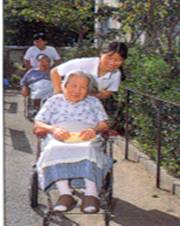
back

|
 |
Baby Boomers' Retirement Poses Problems
Kan Tsutagawa, The Daily Yomiuri
Japan
July 6, 2004

Japan's postwar baby boomers, dubbed the "dankai" generation, are fast approaching the age of mandatory retirement.
This generation's retirement will heavily impact many aspects of the Japanese economy, including labor markets, corporate management, savings and investments.
The Finance Ministry's research institute recently produced an interesting report on how this massive retirement will positively and negatively affect the economy.
At the end of World War II, as Japanese soldiers returned home from fronts overseas, an unprecedented number of them married. Between 1947 and 1949, about 8.06 million babies were born.
These baby boomers are now in their mid-50s and total about 7 million in number, about 5 percent of the nation's population.
The dankai generation's population is about 30 percent larger than the population of those born in three-year periods before and after the baby boom.
The boomers were socialized to be competitive from a very young age, vying with one another to enter the best schools. They were the first children to be reared on television. As teens, they were dubbed the "Beatles generation."
Upon entering university, some of them participated in the antiestablishment movements of the day.
When they joined the workforce in the 1970s, they fueled Japan's rapid economic growth, and their competitive spirit made many baby boomers corporate warriors who tirelessly toiled for their companies.
At the same time, the dankai generation was responsible for the growth in personal consumption and the quality of life many Japanese have come to expect.
And now this historic generation is retiring. In 2007, the first group of baby boomers turns 60, marking the start of the generation's mass retirement. The socioeconomic repercussions may be disastrous if Japan is not prepared.
The ministry's Policy Research Institute report warned that if baby boomers leave the labor market in the manner of generations past, up to 1.09 million workers will disappear from the labor force in 2010.
The aggregate earned income totalling 7 trillion yen will disappear. Add a concurrent decrease in consumption into the calculation, and Japan's gross domestic product could fall by about 16 trillion yen.
Simple calculations show the loss to be equivalent to about 3 percent of about 550 trillion yen of real GDP in fiscal 2003.
Real estate markets will become stagnant as the number of office workers in cities decrease and office space opens up.
The report predicted that 3.4 million square meters of Tokyo's office space--equivalent to 21 times that of Marunouchi Building--will not be needed.
With the increase in pension recipients, the central and local governments' fiscal budgets will face a total additional deficit of 4.5 trillion yen.
The household savings ratio will further decline, and may fall to zero or below between 2007 and 2009.
The report also mentioned that with the baby boomers' retirement, future generations also will lose the dankai generation's work experience and skills. Companies may lose their competitive edge in some industry sectors.
The report suggested taking measures to minimize the negative impacts of the mass retirement.
It also proposed a graduated reduction in employment for those over 60, through combined measures of reemployment, a raised retirement age and public pension reforms.
If many baby boomers continue to work after 60 and the number of retirees falls to 800,000 or less, the decline in real GDP could decrease to 11.6 trillion yen.
The negative impacts of the retirement of the baby boomers may be mitigated by some positive ones, such as an influx of 4.3 trillion yen into the economy. Companies' costs will decline as high-salary employees retire and the newly retired boomers--many of them large asset holders--begin to spend some of their disposable income on travel and other leisure activities.
The report also emphasized that baby boomers are a precious labor source, as Japan likely will face workforce shortages amid a declining birthrate and an aging population.
In the coming years, Japan may have to rely upon those able and willing to work regardless of age and sex.
Fortunately, the middle-aged and elderly in Japan are more willing to work than their counterparts in Western countries.
In the campaigns for the upcoming House of Councillors election, public pension reforms are being hotly debated. Isn't it time we also discussed how those able, willing and over 60 can continue to work?
At the same time, baby boomers must continue to be self-reliant and prepare for the hardships of old age without becoming overly dependent upon younger generations.
Copyright
© 2002 Global Action on Aging
Terms of Use | Privacy
Policy | Contact Us
|



